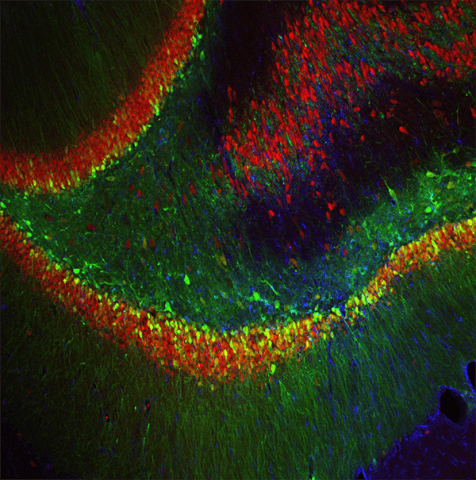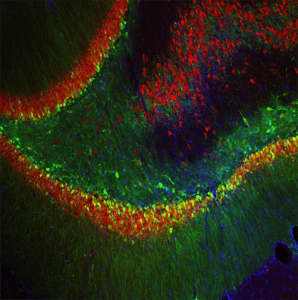FGF9: A New Factor in Major Depression

Scientists from the University of Michigan Medical School have discovered a protein that could be the key to depression. People affected by major depression have 32% more fibroblast growth factor 9 (FGF9) in a specific part of the brain compared to non-depressed people. Rats injected with FGF9 developed the condition, and healthy rats subject to social stress had an increase of FGF9 brain levels. The study was published in the journal Proceedings of the National Academy of Sciences (PNAS).

In green, cells injected with a virus to block FGF9 production and reduce the associated anxiety. From: U. of Michigan
For years, the research team of Dr. Huda Akil has studied brain tissues donated by healthy and depressive people. These human tissue studies are combined with experiments in rats. Depression is a complex disorder that connect many circuits of the brain, not yet fully understood. The discovery of FGF9 upregulation in depressive brains is promising in terms of finding a treatment,as blocking a protein is much safer than increasing its production, which could cause severe side effects.
Dr. Akil and his team are focused on the study of fibroblasts, a common type of connective cell that synthesizes collagen and the extracellular matrix. Specifically, the researchers were experimenting with FGF2 levels in rats. They found that people and rats with low FGF2 levels are more prone to develop depression and other mental disorders, and anxious rats became calm after FGF2 injection. The researchers carried out new experiments to see if they could find new factors in depression. They studied post-mortem samples of brains donated by 36 depressed and 56 non-depressed people. The research team measured expression levels of an array of genes in the hippocampus, the brain area for stress control. The hippocampus is usually smaller in depressive brains due to chronic stress of cells in the area. The experiments showed an increase of FGF9 production in depressive brains, and a decrease in other FGFs, which shows that the whole cell growth and development system is deregulated in depressive people.
After the experiments in human tissues, the team studied the effects of FGF9 in whole mammalian organisms. The researchers found out that stressed rats had higher FGF9 levels. Healthy rats injected with FGF9 acquire anxious behaviors. Finally, blocking 30% of FGF9 production at the hippocampus with a lentiviral vector decreased the anxiety of these rats.
Dr. Akil and his team are currently studying why FGF9 levels are increased in some organisms, how this affects general brain communication or other organs and what are the levels in other brain parts.
Source: U. of Michigan
